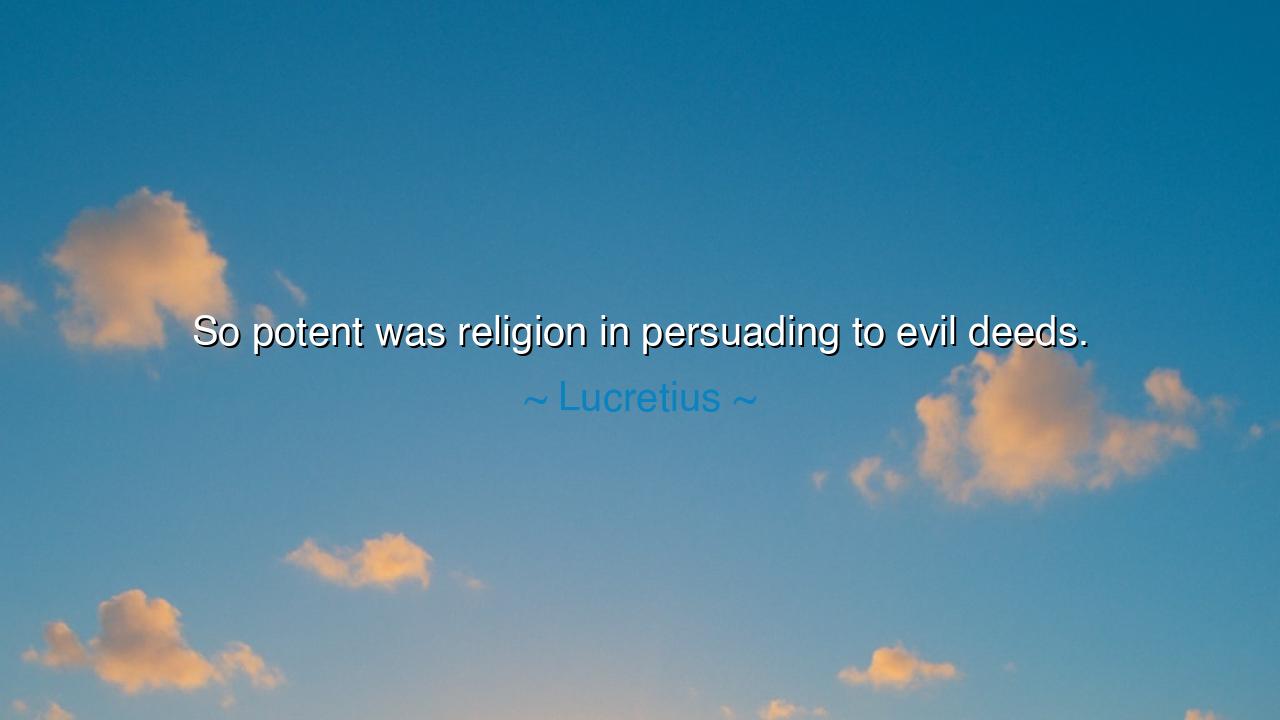
So potent was religion in persuading to evil deeds.






In the annals of history, there exists a powerful and often troubling truth about the influence of religion. The ancient philosopher Lucretius, in his wisdom, observed the profound effect that religious belief can have on the human mind, writing, “So potent was religion in persuading to evil deeds.” This statement carries with it a somber reflection on the ways in which faith, when twisted or misinterpreted, can become a force not of peace, but of destruction. Lucretius warns us that religion, despite its lofty ideals, has often been used to justify the most heinous actions of mankind, leading people down dark paths, veiling their consciences, and encouraging the committing of evil deeds.
The power of religion to inspire both good and evil is a paradox that has echoed through the corridors of time. In the name of the divine, countless acts of violence and cruelty have been carried out. From the Crusades in the Middle Ages to the Inquisition, where those deemed heretics were tortured and killed, religion has often been wielded as a tool of control, fear, and intolerance. Leaders have used the divine as a weapon, persuading followers to commit atrocities against their fellow human beings, promising rewards in the afterlife or punishment for those who resist. It is a sobering reminder that religion, when used with malicious intent, can become a source of evil, even though its original message is meant to bring love and peace to the world.
Consider the story of the Salem Witch Trials, where Puritan belief in witchcraft led to the execution of 20 innocent people in colonial America. Fueled by fear, superstition, and a religious fervor that demanded absolute obedience, entire communities turned on one another, accusing their neighbors of witchcraft based on flimsy evidence and the unshakable belief that they were serving the will of God. In this case, religion became the excuse for inhumanity, persuading people to turn against their own kin, to commit deeds of violence and injustice in the name of divine righteousness. It is a haunting reminder of the dangers of blind faith, and the harm that can come when belief becomes disconnected from reason and compassion.
Lucretius’s words also speak to the broader issue of human nature, which is easily swayed by powerful ideas. When a person or a society becomes convinced that they are acting in the service of a higher power, it can override their moral compass, enabling them to justify acts of violence, hatred, and intolerance. The Crusaders, for instance, believed they were doing God’s will when they slaughtered Muslims and Jews during their campaigns to reclaim the Holy Land. The pursuit of religious righteousness became an all-consuming force, and the divine was invoked to justify the killing of thousands of people. Lucretius understood this danger—he saw that when religion is distorted into a tool of power, it can lead people to commit the very evil deeds it was meant to prevent.
Yet, despite these historical misuses of religion, we must not ignore its potential for good. Religion, at its core, has been a source of comfort, guidance, and hope for countless generations. It has inspired some of the most profound acts of compassion and selflessness. The teachings of Jesus Christ, for example, have led millions to acts of kindness, forgiveness, and love, and the work of Gandhi and Martin Luther King Jr., both of whom drew deeply from their faith, helped to foster justice and peace in the world. The challenge, as Lucretius reminds us, lies in the interpretation and use of religious teachings. When wielded rightly, religion can elevate the spirit and bind communities together in unity and love; when misused, it can cause unspeakable harm.
The lesson that Lucretius imparts is not a condemnation of religion itself, but a warning about the danger of unchecked belief. Faith, when rooted in love, understanding, and reason, has the potential to heal and unite. But when driven by fear, fanaticism, and the lust for power, it can lead to the most devastating actions. Thus, it is the responsibility of every individual to examine the intentions behind their beliefs, to ensure that their actions align with the core principles of love, justice, and peace. Religion must never be used as a tool of oppression or violence, but as a force for good, for the betterment of humanity.
In our own lives, we must be vigilant, asking ourselves whether the faith we carry leads us toward a path of peace or whether it has the potential to harden our hearts against others. Let us take Lucretius’s warning to heart: religion should never be a justification for evil deeds, but rather a call to cultivate compassion and understanding. By examining our beliefs and their consequences, we can ensure that the teachings we follow bring light into the world, rather than darkness. Let us strive to be guided by the true values of humanity—love, compassion, and respect—so that we may not be swayed by the dangerous power of misguided belief.






AAdministratorAdministrator
Welcome, honored guests. Please leave a comment, we will respond soon